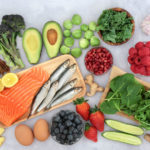What's the Best Diet for Healthy Weight Loss?
Which of the currently popular (fad?) diets is best? Can you discuss the pros and cons of low carb vs. high carb diets?
Andrew Weil, M.D. | June 11, 2004

At the nutrition conference I helped organize in Tucson in March 2004 for medical professionals, we discussed the proliferation, popularity, strengths and weaknesses of fad diets. Here’s a rundown of the pros and cons of those we focused on:
- The ZONE: On the plus side, The ZONE encourages people to exercise, drink lots of water, and limit carbohydrates while balancing proteins and fat. It distinguishes between good and bad fats and better and worse carbohydrates. However, I do not like its suggestion that food should be regarded as a drug to manipulate your hormones and metabolism – that is not a healthy attitude toward food and eating. Overall, however, the ZONE is one of the better diets out there for healthy weight loss.
- The Perricone Diet: Touted as “the wrinkle cure,” this diet, devised by a dermatologist, holds that eating high-quality animal protein (excluding red meat) as well as healthy fats, lots of fresh berries and pure-water will reduce inflammatory changes in the body and thereby prevent wrinkles. These recommendations are good, but there is no scientific evidence that any eating plan can prevent or eliminate wrinkles. Also, Dr. Perricone tells you to eat an immoderate amount of salmon and fails to warn about the dangers of farmed salmon.
- The Ornish Diet: Mainly a very low-fat, vegetarian plan, this diet, in combination with group support, stress reduction, and moderate exercise, was devised to halt (even reverse) coronary heart disease. In my view the emphasis on very low-fat intake is obsolete and fails to take note of the important distinction between high and low glycemic-load carbohydrate foods. Most people not facing invasive cardiac procedures will not have the motivation to stick with this restrictive diet.
- The South Beach Diet: Devised by a noted cardiologist, this diet requires you to eliminate carbohydrates for two weeks and then add back specific, low glycemic-load carbs. Its weaknesses are that you don’t count calories or control portion size, exercise isn’t addressed, and I think there is too much emphasis on meat. The underlying assumption is that if you’re overweight, you must be insulin resistant, which isn’t true for everyone.
- The Atkins Diet: Here you also eliminate most carbs and don’t count calories. My major objection to this one is its failure to distinguish between good and bad fats (olive oil and other monounsaturates being the good ones and polyunsaturates the unhealthy ones). Similarly, there isn’t enough emphasis on fiber, vitamins and minerals, all of which are important in disease prevention. If you’re on Atkins, you miss out on health-protective phytochemicals found in fruits and many vegetables and don’t learn to differentiate between healthy low glycemic-load carbs and less healthy high-glycemic load ones. Some studies have shown that short-term use of the Atkins diet is safe and effective for healthy weight loss. Many physicians are concerned about long-term health risks.
Despite the popularity of these diets, in the long run, the best way to achieve and maintain weight is to eat less and exercise more. Eat the right amounts of the right kinds of foods, and re-learn what it means to be more physically active for healthy weight loss.
Andrew Weil, M.D.
For diet tips and more on healthy weight loss, view more articles by Dr. Weil.












